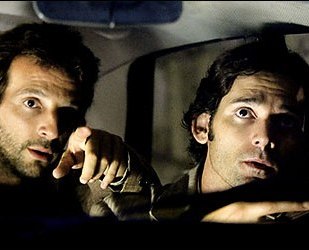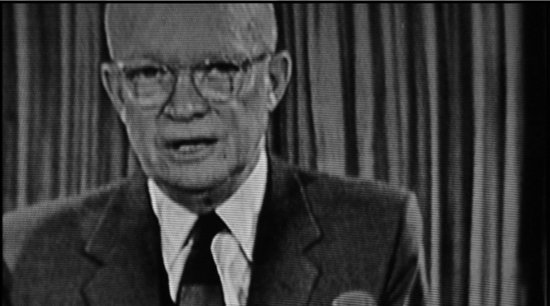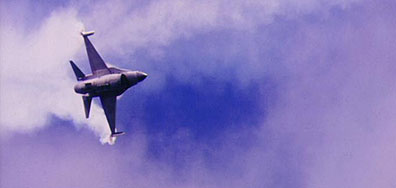To the consternation of the Dubya administration, the Sydney Morning Herald posts more horrifying and previously unpublished pictures from Abu Ghraib. (Warning: They’re grisly, as you might expect.) Why doesn’t Cheney want to ban this flagrantly unAmerican behavior again? He must realize this type of national disgrace makes us hypocrites before the world. [First seen at Ed Rants/Blivet.] Update: Walter Shapiro: “Abu Ghraib is not an issue of partisan sound bites or refighting the decision to invade Iraq. Grotesque violations of every value that America proclaims occurred within the walls of that prison.” Salon has more.
Category: The Middle East
Fight Club.
“In the councils of government, we must guard against the acquisition of unwarranted influence, whether sought or unsought, by the military-industrial complex. The potential for the disastrous rise of misplaced power exists and will persist. We must never let the weight of this combination endanger our liberties or democratic processes.” That flaming liberal Dwight Eisenhower’s somber farewell address to the nation is the historical and thematic anchor for Eugene Jarecki’s documentary Why We Fight, a sobering disquisition on American militarism and foreign policy since 9/11. In essence, Why We Fight is the movie Fahrenheit 9/11 should have been. Like F911, this film preaches to the choir, but it also makes a more substantive critique of Dubya diplomacy and the 9/11-Iraq switcheroo, with much less of the grandstanding that marred Moore’s earlier documentary (and drove right-wing audiences berzerk.)
Sadly, the basic tale here is all-too-familiar by now. Ensconced in Dubya’s administration from the word go, the right-wing think-tank crowd (Wolfowitz, Perle, Kristol, etc.) used the tragedy of 9/11 as a pretext to enact all their neocon fantasies (spelled out in this 2000 Project for a New American Century report), beginning in Iraq. Taken into consideration with Cheney the Military-Contractor-in-Chief doling out fat deals to his Halliburton-KBR cronies from the Vice-President’s office, and members of Congress meekly signing off on every military funding bill that comes down the pike (partly because, as the film points out, weapons systems such as the B-1 or F-22 have a part built in every state), it seems uncomfortably clear that President Eisenhower’s grim vision has come to pass.
To help him rake this muck, Jarecki shrewdly gives face-time not only to learned critics of recent foreign-policy — CIA vet Chalmers Johnson, Gore Vidal (looking unwell) — but also to the neocons themselves. Richard Perle is here, saying (as always) insufferably self-serving things, and Bill Kristol glows like a kid in a candy store when he gets to talk up his role in fostering Dubya diplomacy. (Karen Kwiatkowski, a career military woman who watched the neocon coup unfold within the corridors of the Pentagon, also delivers some keen insights.) And, when discussing the corruption that festers in the heart of our Capitol, Jarecki brings out not only Charles Lewis of the Center for Public Integrity but that flickering mirage of independent-minded Republicanism, John McCain. (In fact, Jarecki encapsulates the frustrating problem with McCain in one small moment: Right after admitting to the camera that Cheney’s no-bid KBR deals “look bad”, the Senator happens to get a call from the Vice-President. In his speak-of-the-devil grimace of bemused worry, you can see him mentally falling into line behind the administration, as always.)
To be sure, Why We Fight has some problems. There’s a central tension in the film between the argument that Team Dubya is a corrupt administration of historical proportions and the notion that every president since Kennedy has been party to an increasingly corrupt system, and it’s never really resolved satisfactorily here. Jarecki wants you to think that this documentary is about the rise of the Imperial Presidency across five decades, but, some lip service to Tonkin notwithstanding, the argument here is grounded almost totally in the Age of Dubya. (I don’t think it’s a bad thing, necessarily, but it is the case.) And, sometimes the critique seems a little scattershot — Jarecki seems to fault the Pentagon both for KBR’s no-bid contracts and, when we see Lockheed and McDonnell-Douglas salesmen going head-to-head, for bidding on contracts. (Still, his larger point is valid — As Chalmers Johnson puts it, “When war becomes that profitable, you’re going to see more of it.“)
Also, the film loses focus at times and meanders along tangents — such as the remembrances of two Stealth Fighter pilots on the First Shot Fired in the Iraq war, or the glum story of an army recruit in Manhattan looking to turn his life around. This latter tale, along with the story of Wilton Sekzer, a retired Vietnam Vet and NYPD sergeant who lost his son on 9/11 and wants somebody to pay, are handled with more grace and less showmanship than similar vignettes in Michael Moore’s film, but they’re in the same ballpark. (As an aside, I was also somewhat irked by shots of NASA thrown in with the many images of missile tests and ordnance factories. Ok, both involve rockets, research, and billions of dollars, but space exploration and war are different enough goals that such a comparison merits more unpacking.)
Nevertheless, Why We Fight is well worth-seeing, and hopefully, this film will make it out to the multiplexes. If nothing else, it’ll do this country good to ponder anew both a president’s warning about the “disastrous rise of misplaced power,” and a vice-president’s assurance that we’ll be “greeted as liberators.”
Send in Sgt. Brockovich.
“The water expert said he told company officials at the base that they would have to notify the military. ‘They told me it was none of my concern and to keep my mouth shut,’ he said.” Ah, the perks of a no-bid contract. As e-mail records prove, those patriots at Halliburton, Dick Cheney’s favorite corporate cronies, have been knowingly exposing some soldiers to contaminated water, despite being warned by their own employees about the danger. “Another former Halliburton employee who worked at the base, Ken May of Louisville, said there were numerous instances of diarrhea and stomach cramps.”
Nuclear Chess, or Nuclear Chicken?
“So, here’s the big question: If diplomacy is the only rational solution to this problem yet the Iranians just want nukes — in other words, if there is no deal (or at least no deal that the United States would realistically offer) that would compel them to give up their dream — what’s the next step?” Slate‘s Fred Kaplan admits to being stymied on the troubling question of Iranian nukes.
Red Letterman Day.
“I’m not smart enough to debate you point to point on this, but I have the feeling, I have the feeling about 60 percent of what you say is crap.” Along the lines of (2006 Oscars host) Jon Stewart on Crossfire in 2004, a driven-to-anger David Letterman goes after guest Bill O’Reilly on Cindy Sheehan, the war in Iraq, and his “fair and balanced” drivel. “I agree to you, with you that we have to support the troops. They are there, they are the best and the brightest of this country…however, that does not eliminate the legitimate speculation and concern and questioning of ‘Why the Hell are we there to begin with?’” (Via Dumbmonkey.)
The Lessons of Munich.
 If at times somewhat turgid, Steven Spielberg’s Munich, which I caught this afternoon, is a lively and admirable piece of filmmaking. For the most part, it works as both an expertly-told cloak-and-dagger thriller and a timely rumination on the moral consequences and violent blowback that accompany vengeance as an anti-terror policy. (Indeed, the film infuses Spielberg’s dramatic strengths with contemporary gravitas much more smoothly and profoundly than this summer’s War of the Worlds, which, like Tom Cruise’s earlier Collateral, seemed like it’d be a better movie until taking a tremendously ill-conceived jag in the second hour.) Still, while Munich is assuredly a very good film, ultimately I think the gears grind a bit too loudly at times to consider it a great one.
If at times somewhat turgid, Steven Spielberg’s Munich, which I caught this afternoon, is a lively and admirable piece of filmmaking. For the most part, it works as both an expertly-told cloak-and-dagger thriller and a timely rumination on the moral consequences and violent blowback that accompany vengeance as an anti-terror policy. (Indeed, the film infuses Spielberg’s dramatic strengths with contemporary gravitas much more smoothly and profoundly than this summer’s War of the Worlds, which, like Tom Cruise’s earlier Collateral, seemed like it’d be a better movie until taking a tremendously ill-conceived jag in the second hour.) Still, while Munich is assuredly a very good film, ultimately I think the gears grind a bit too loudly at times to consider it a great one.
After a chilling retelling of the horrible events that forever marred the 1972 Olympics (told mostly through newsfootage at first, with reenactment filling in the details later on) and a grim strategy session presided over by Golda Meir (Lynn Cohen), the film introduces us to Avner (Eric Bana), the family man-cum-Mossad agent assigned to head one of Israel’s deep-undercover response teams. Comprised of embittered wheelman Steve (Daniel Craig), nebbishy bombmaker Robert (Matthieu Kassovitz), resigned forger Hans (Hanns Zichler), and conflicted clean-up man Carl (Ciaran Hinds), Avner’s team crisscrosses various scenic European vistas, clumsily dealing death to the alleged perpetrators of the Munich tragedy. (One would think an assassination squad that included James Bond, Julius Caesar, and the Hulk wouldn’t have as much trouble as they do here.) But as the (terrorist and collateral) body count piles up and Avner’s hunters become the hunted, these agents of vengeance increasingly question the righteousness of their retribution, and wonder whether the costly murders they’ve perpetrated have made any dent in the war against Black September.
 The acting in Munich is universally good, with special marks going to Bana and his colleagues, particularly as their early relish for the job shades into reluctance and, eventually, paranoia and abject horror. (Mathieu Amalric and Marie-Josee Croze are also memorable as a French information dealer and Dutch assassin respectively.) And, for most of the film, Spielberg’s direction is exquisite. Still, sadly, there are some flaws — The pacing of Munich noticeably lags in the middle hour. And, more troubling, the film seems to strain visibly at times to seem arty and high-minded. For every few import-laden scenes executed with a deft touch (for example, the sequence in which Avner’s team shares a safehouse with a PLO cell), there’s one where the symbolism seems just a tad inflated. (Particularly egregious in this regard is the, ahem, climax, which intercuts the Munich massacre with scenes of a tortured-looking Avner having sex with his wife. What, exactly, does this mean? Are love and war meant to seem oppositional or synchronous? Is this union the “home” that Israel must protect, or what? Whatever the intended message, the scene comes across as not only opaque but overblown.)
The acting in Munich is universally good, with special marks going to Bana and his colleagues, particularly as their early relish for the job shades into reluctance and, eventually, paranoia and abject horror. (Mathieu Amalric and Marie-Josee Croze are also memorable as a French information dealer and Dutch assassin respectively.) And, for most of the film, Spielberg’s direction is exquisite. Still, sadly, there are some flaws — The pacing of Munich noticeably lags in the middle hour. And, more troubling, the film seems to strain visibly at times to seem arty and high-minded. For every few import-laden scenes executed with a deft touch (for example, the sequence in which Avner’s team shares a safehouse with a PLO cell), there’s one where the symbolism seems just a tad inflated. (Particularly egregious in this regard is the, ahem, climax, which intercuts the Munich massacre with scenes of a tortured-looking Avner having sex with his wife. What, exactly, does this mean? Are love and war meant to seem oppositional or synchronous? Is this union the “home” that Israel must protect, or what? Whatever the intended message, the scene comes across as not only opaque but overblown.)
Still, not to miss the forest for the trees, Munich is a movie well worth-seeing, the rare thriller that’s not afraid to grapple with today’s thorniest political questions, and without insulting the audience’s intelligence by giving easy, simple-minded answers to seemingly insoluble problems. The film may at best be a long triple, but, to his credit, at least Spielberg is swinging for the fences.
Lies about Lies.
Thanks to more lies emanating from the Dubya administration, the Congressional Research Service is forced to set the record straight: Dubya saw more prewar intelligence than Congress. “The Bush administration has routinely denied Congress access to documents, saying it would have a chilling effect on deliberations. The report…concludes that the Bush administration has been more restrictive than its predecessors in sharing intelligence with Congress.“
Tehran Twaddle.
“The West has given more significance to the myth of the genocide of the Jews, even more significant than God, religion, and the prophets.” In the world-gets-even-scarier-department, Iran’s hardliner president publicly indulges in Holocaust denial. Clearly, Iran is living up to its axis-of-evil appellation these days, but remember: Ahmadinejad’s election was in part blowback from Dubya’s amateurish and tone-deaf Middle-East policy in the first place. At any rate, it’s clear that our Iran situation is worsening, and that Iranian possession of nukes could be a very frightening scenario.
Mea Culpa, Sort-of.
“It is true that much of the intelligence turned out to be wrong. As president I am responsible for the decision to go into Iraq.” In his final speech on Iraq before tomorrow’s elections, (text) Dubya admits the case for war was FUBAR, while insisting it was a good idea anyway. (“The United States did not choose war — the choice was Saddam Hussein’s.“) Of course, Bush neglected to mention that it was he, Cheney, Rumsfeld, et al who cherry-picked through the available intelligence and continued to recite claims they knew to be false. Still, for someone who’s seems pathologically incapable of accepting reality at times, this has to be considered a step forward.
Breaking all the Rules (of Law).
An ugly day for American values around the world: In Iraq, an investigation inaugurated after the recent discovery of secret prisons in Baghdad uncovers at least 120 victims of torture and/or abuse in prisons run by the new Iraq Interior Ministry. “Prisoners had their bones broken and their fingernails pulled out, were subjected to electric shocks and had burning cigarettes crushed into their necks and backs, said the Iraqi official.” And, elsewhere, a European investigation suggests that the CIA were in fact holding prisoners illegally in Europe, until they were surreptitiously moved to North Africa after the story broke. Charming. So is this what Dubya meant when he said “we are determined to show the meaning and promise of liberty” to the world? If so, I’d remind him of the Lincoln quote he used in the same inaugural address: “Those who deny freedom to others deserve it not for themselves; and, under the rule of a just God, cannot long retain it.“



